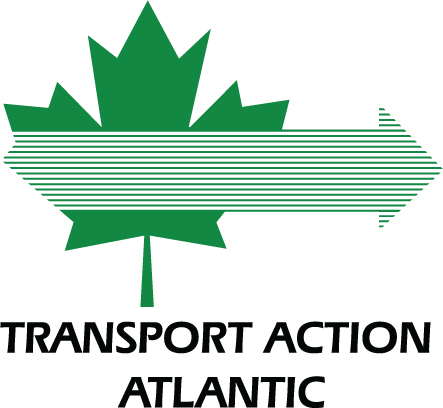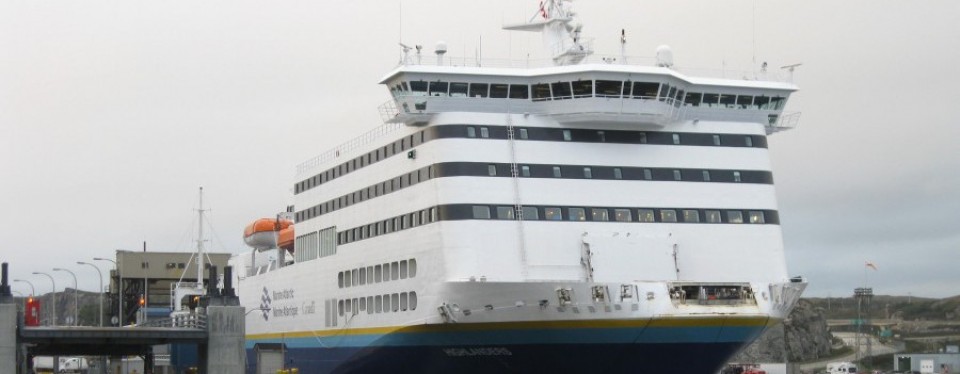Welcome to the May 2022 installment of Atlantic Transport News!
Here’s a look at what you’ll find in this edition:
- Transit agencies struggle amid record fuel prices
- PEI’s Island Transit reaches milestone as routes expand westward
- VIA Rail CEO resigns abruptly
- VIA tri-weekly service resuming – but amenities remain uncertain
- NS airports get government cash as traffic rebounds
- Lively discussion expected at TAA’s annual meeting
TRANSIT AGENCIES STRUGGLE AMID RECORD FUEL PRICES

The soaring price of diesel fuel is having a severe effect on already-struggling municipal and urban transit systems and intercity bus operators in Atlantic Canada. In most areas, the price per litre is at least a dollar higher than it was at the beginning of the year. In both New Brunswick and Newfoundland cities are calling on their provincial governments to take advantage of federal joint funding offers to help transit.
In St. John’s alone, Metrobus is predicting fuel costs will push the system $1.4 million over budget unless fares are raised or service reduced – which neither the agency nor City Hall wants to do. So far there’s no sign the Province is prepared to respond favourably. In fact, even though private autos and light trucks are getting a 50% rebate on registration renewals to help offset fuel costs, no such offer has been made with respect to transit vehicles.
A similar situation exists in New Brunswick, where the Premier Blaine Higgs has reached an agreement with Ottawa, under which federal contributions earmarked for transit and matched by the Province can be used for purposes other than what was originally intended. For NB, that means investment in highways and bridges, including highway twinning. Transport Action Atlantic views this as a most unfortunate turn of events – one that can only strengthen the car culture in a place where residents spend a far higher proportion of their income on motor fuel than any other Canadians.
PEI’S ISLAND TRANSIT REACHES MILESTONE AS ROUTES EXPAND WESTWARD
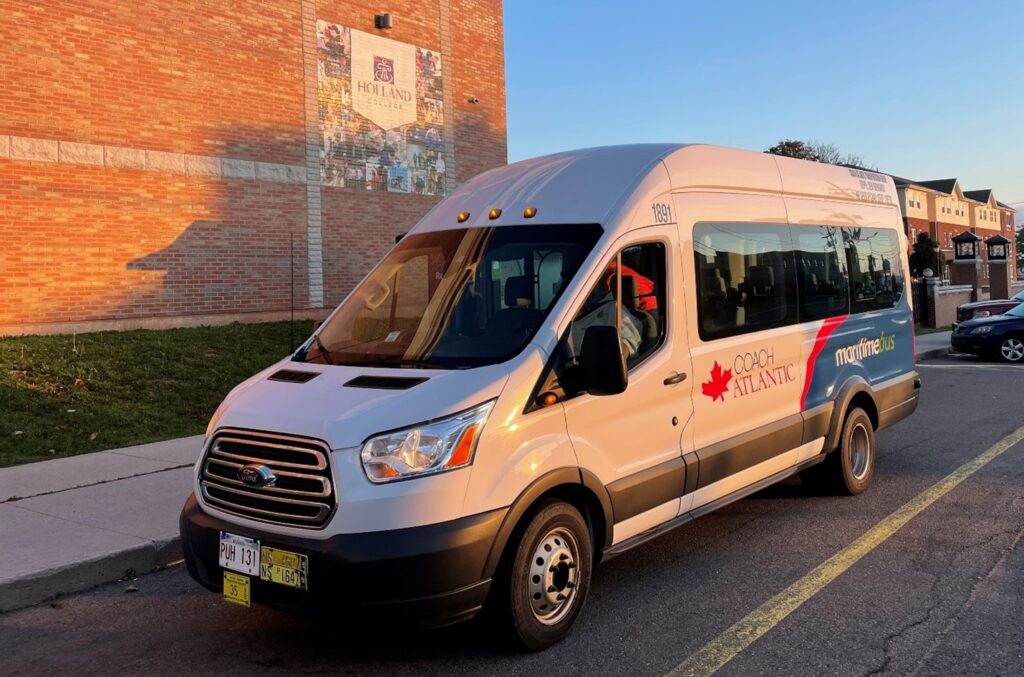
Canada’s smallest province continues to be a leader in public transportation. PEI’s Island Transit network was extended to the western end of the province effective 19 April. Residents are now able to effectively travel from one end of the island to the other for just a $2 fare, which includes a transfer to the T3 Transit service in Charlottetown.
Island transit reached a significant milestone on May 10. For the first time, the early morning bus arriving in Charlottetown from Souris had every seat occupied – a strong indication that Premier Dennis King’s transit-friendly policies are having the intended effect. Service in eastern PEI began in October 2021, and ridership has been growing steadily to the point where additional equipment may soon be needed.
Meanwhile, Mike Cassidy of Maritime Bus says the daily average of paid fares on their system continues to climb, from 266 in March, through 300 in April, to 349 for the first eight days of May. The fuel surcharge is set jointly by the regulators in Nova Scotia and New Brunswick based on a three-month weighted average, a process in which the company plays no part. It is currently 9.5%, but will increase for the next period based on the current price of diesel. Mr. Cassidy notes that base fares haven’t increased in ten years, because of the automatic adjustment for fuel costs. He says his corporate value philosophy is to keep fares affordable, and his biggest fear is overpricing the service.
VIA RAIL CEO RESIGNS ABRUPTLY
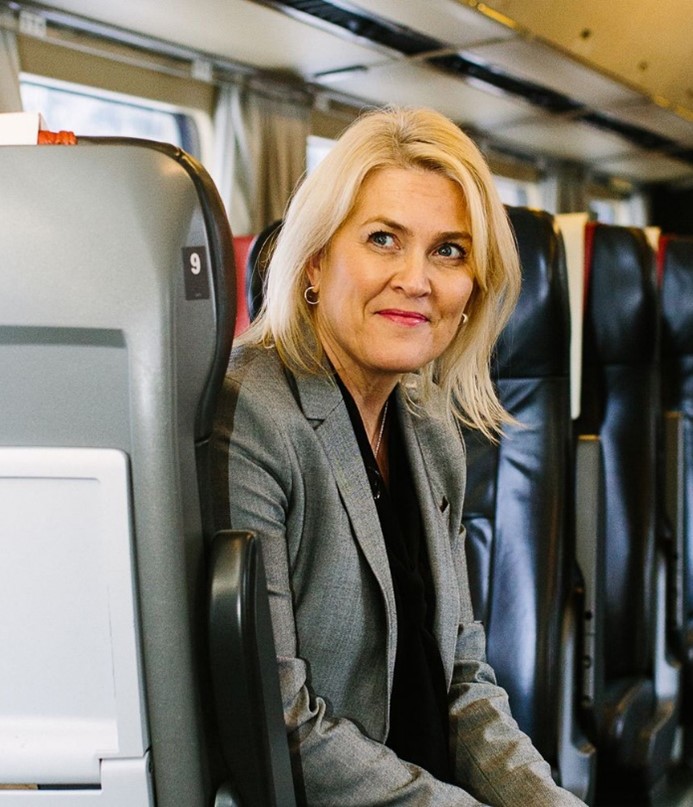
Once again there has been a change in command at VIA Rail Canada. In a tersely-worded statement just before the May long weekend, Transport Minister Omar Alghabra announced the immediate departure of Cynthia Garneau, after just three years on the job and two years before her order-in-council appointment was due to end.
“I would like to thank Ms. Garneau for her service and her work over the past three years in contributing to the modernization of VIA Rail, and adapting VIA Rail operations during the height of the COVID-19 pandemic, while always ensuring the health and safety of employees and passengers,” the minister said, adding “I wish Ms. Garneau the best of luck in her future endeavours.”
No reason was given for the sudden resignation, with the former CEO saying only that her train had arrived at its destination, and she was leaving with a sense of accomplishment.
Ms. Garneau faced a difficult challenge from the day she arrived at VIA. She was new to the company and its culture, she had no railroad background, or any experience in an organization carrying passengers or with a need to appreciate customer relationships on a large but very personal scale. She’d been at VIA only ten months when COVID struck.
Her tenure will not likely be remembered as being positive for Atlantic Canada, or anywhere else outside the Toronto-Ottawa-Montreal-Quebec City corridor, where her focus had been clearly concentrated. Transport Action Atlantic was not able to obtain a meeting with her – not even a virtual one – during those three years, further reinforcing the perception that, in VIA’s view, Canada ends at Quebec City.
VIA board chair Françoise Bertrand announced that Martin Landry, who has served as the corporation’s chief commercial officer for the past eight years “will ensure business continuity”. Mr. Landry, who previously served in various senior roles at IBM, was recruited by former VIA CEO Yves Desjardins-Siciliano.

VIA TRI-WEEKLY SERVICE RESUMING – BUT AMENITIES REMAIN UNCERTAIN
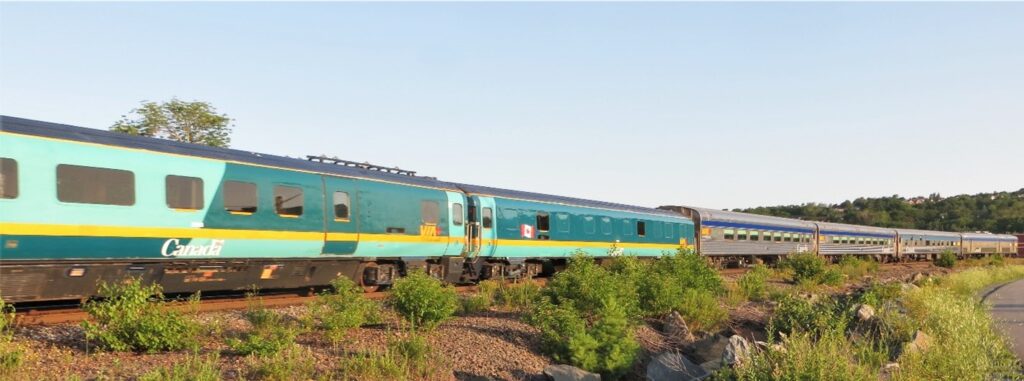
Restoration of pre-COVID service frequency by VIA Rail’s Ocean is just a few weeks away. The Crown corporation confirmed in a mid-April media release that the tri-weekly schedule would resume effective June 3, with departures from both Montreal and Halifax on Sundays, Wednesdays and Fridays. However, it’s still unclear what the summer consists will look like. The online reservation system indicates that additional sleeping car capacity is on offer, using Chateau stainless steel cars, but there has been no word on what, if anything, will replace the Park-series observations cars which can no longer operate because the train cannot be turned in Halifax. Unless this issue is addressed, it will represent a significant downgrading of service quality for the higher-revenue sleeper-class passengers – one that will clearly make the product less attractive than it previously was.
Although dining car service is now available to sleeper passengers, other safety measures in response to COVID-19 remain in effect. Those include a continuous masking policy on trains (except in enclosed sleeper accommodation) and in stations, as well as mandatory vaccination as required by the federal government.
NS AIRPORTS GET GOVERNMENT CASH AS TRAFFIC REBOUNDS
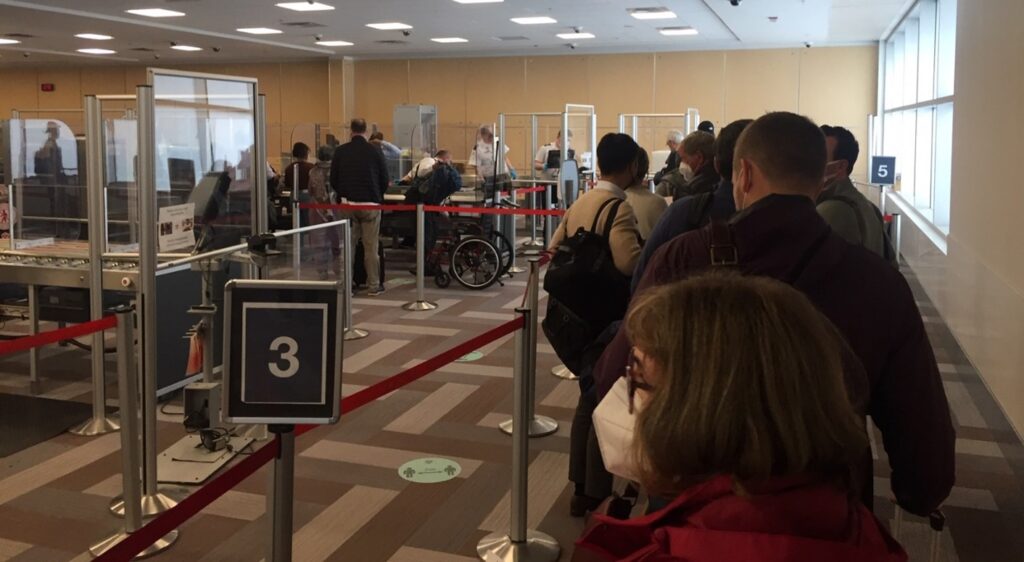
Activity at airports across Atlantic Canada is slowly rebounding, as people gradually regain their confidence about travelling. Although horror stories abound about excessive security and customs delays at some of Canada’s larger airports, this region appears to have been spared most of the grief, which has been generally attributed to staffing shortages. Schedules are slowly becoming more frequent, as both airliners and airport authorities look ahead to summer with cautious optimism.
Governments generally appear to be more focused on encouraging people to fly than on promoting greener forms of transportation. As a case in point, on May 6 the Nova Scotia government handed out nearly $20 million in funding to help airports in Sydney and Halifax recover from the pandemic and attract new airlines and flights. Of this $6.3 million goes to Sydney and $13 million to Halifax. In the latter case, the money will be spent on attracting U.S. and international flights, and also to re-establish domestic services that were cut during the pandemic. However, as reported last month in this space, both overseas and transborder operations at YHZ are already showing encouraging signs of recovery.
Meanwhile, at annual meetings held recently both the Moncton and Saint John airport authorities reported a much improved outlook for their respective bottom lines. Even the smaller airports are seeing increased numbers of arrivals and departures, with new flights being introduced at bargain prices by low-cost carriers.
LIVELY DISCUSSION EXPECTED AT TAA’S ANNUAL MEETING

PHOTO – NL House of Assembly
The agenda is almost finalized for Transport Action Atlantic’s annual general meeting, to be held virtually using the ZOOM platform on Saturday, May 28, beginning at 1400 ADT (1430 NDT). In addition to the required business, there’s extensive discussion planned on three major issues that TAA has been closely following over the past year – public transit, passenger rail, and Marine Atlantic ferry rates. Confirmed or tentative speakers and panellists include Newfoundland and Labrador cabinet minister Gerry Byrne, Maritime Bus founder Mike Cassidy, New Brunswick transit advocate Yves Bourgeois, long-time Trains magazine passenger rail columnist Bob Johnston, and Deatra Walsh, policy and advocacy director for the NL municipalities federation.
The business agenda includes annual reports and financial statements, appointment of an auditor, election of a board of directors, and any other organizational matters that may arise. This is expected to require about 45 minutes, after which the discussion portion of the meeting will begin.
As always, our AGM is open to the general public and the media. Non-members who’d like to attend should request credentials by e-mail to atlantic@transportaction.ca.
